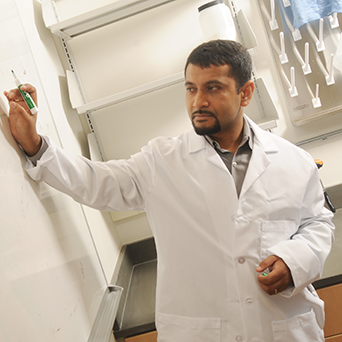
Siddhartha Sikdar is one of the leaders of the Center for Adaptive Systems for Brain-Body Interactions.
Mason Engineering faculty members will contribute to one of university’s first transdisciplinary centers for advanced study, one of only two such centers chartered in the university's grant competition.
The Center for Adaptive Systems for Brain-Body Interactions (CASBBI), led by Siddhartha Sikdar (bioengineering), Jim Thompson (psychology), and Lynn Gerber (health administration and policy), has been selected for base funding by a team led by the Office of the Provost and Executive Vice President S. David Wu.
"The goal of our center is to study all aspects of chronic disability—physical, biological, and psychosocial—in an integrative framework," says Sikdar, an associate professor in the Department of Bioengineering.
Mason’s transdisciplinary centers reflect the university's intent to establish new venues for promoting research and discovery, especially around questions that cross conventional disciplinary boundaries. To be considered for funding, each center was required to present a compelling long-term vision for informing and enriching Mason’s education and translation research programs and rely upon the complementary expertise of multi-departmental or multi-unit faculty teams.
The CASBBI was one of two teams selected for funding during the initial competition, which drew 26 proposals; the Office of the Provost also selected the Quantum Materials Center led by Patrick Vora (physics), Qiliang Li (electrical and computer engineering), and James Glasbrenner (computational and data sciences).
The Center for Adaptive Systems for Brain-Body Interactions seeks to serve individuals with physical or psychosocial disabilities, with a particular focus on chronic pain, movement impairment, autism spectrum disorders, and addiction. These widespread disabilities pose significant costs—emotional and economic—to affected individuals, their families, and society. Moreover, current approaches have not effectively managed their complexity or offered workable solutions.
Drawing upon transdisciplinary research from Mason’s Departments of Bioengineering, Psychology, Health Administration and Policy, Electrical and Computer Engineering, Computer Science, and Physics, the CASBBI team hopes to improve the function and quality of life of affected people by identifying disability as at once biological, psychological, and social, and seeking to address it across the dynamic relations among these three areas.
The team comprises representatives from four of Mason’s colleges and schools: Volgenau School of Engineering, the College of Humanities and Social Sciences, the College of Heath and Human Services, and the College of Science. They bring research expertise in multiscale imaging, multiscale neuromodulation, human movement analysis, and human machine interaction.
As part of its submission for funding, the team considered ways to operationalize teamwork, how to best incorporate graduate students into the work of the center, and how to take advantage of the institutional opportunities available within the Commonwealth. Team members have established milestones for the success of their work and thought through the team’s strengths, weaknesses, opportunities, and threats.
